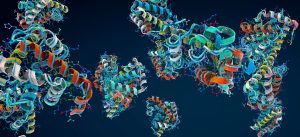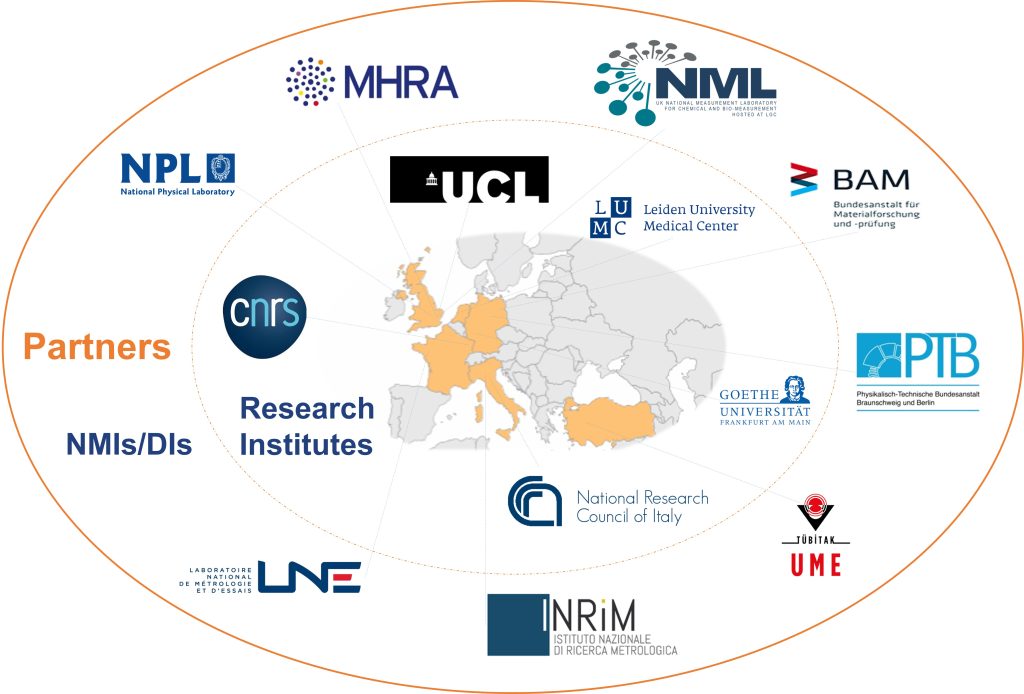



ProMET is a consortium of 13 partners with world-renowned expertise, gathering:

LNE has extensive expertise in developing higher order RMPs and CRMs for protein biomarkers (PCT, Tau). LNE will use these capabilities to develop MS-based method to assess protein purity, protein structure impact on measurement and its metrological core expertise. LNE is also involved in CCQM PAWG, IFCC working groups and JCTLM and chairing the EMN TraceLabMed.
BAM has broad experience in bioanalytical techniques and the use of high-end instrumentation, such as LC-MS (UHPLC, nanoLC, MS, Tandem Mass Spectrometry (MS/MS), HRMS), development and characterisation of antibodies, development of immunoassays or immunoaffinity enrichments. BAM is leading WP4.
INRIM has experience in the development of advanced analytical methods for organic and inorganic analytes, microscopy technologies, chemical analysis and food related matrices characterisation using LC-HRMS, ICP-MS, Dynamic light scattering (DLS), and NMR. INRIM is chairing the EMN on Safe and Sustainable Food (EMN Food), is part of the METROFOOD RI and CCQM PAWG.
PTB has significant expertise in the metrological purity assessment of biomolecules and provides traceable results for the characterisation of RMs using IDMS and in quantitative proteomics strategies in biological samples as well as XL‑MS approach to characterise protein conformational states and protein-protein interactions. PTB is chair of CCQM PAWG. PTB is leading WP3.
TUBITAK‘s provides SI traceability for the measurement by LC-MS of large biomolecules such as peptides and proteins.
CNR has a significant expertise in all proteomics-related techniques including sample preparation, electrophoresis, Liquid chromatography coupled to Tandem Mass Spectrometry (LC-MS/MS) and bioinformatics for protein characterisation and quantification.
CNRS has long-standing experience in proteomics, structural MS and bioinformatics using nMS, IM‑MS, HDX‑MS and ion mobility (CIU) mass spectrometry. CNRS is leading WP2.
GUF has a world‑renowned expertise in structural biology and an excellent and proven track record of producing difficult to express recombinant proteins (kinases, GPCR, phosphatases) and in structural characterisation by NMR and qNMR.
LUMC has a significant expertise in bioanalytical chemistry, MS and data analysis and in-depth experience in developing and applying MS for the quantification of protein and for the structural and functional characterisation of glycoproteins. LUMC is currently chairing the IFCC Scientific Division and WG on apolipoprotein quantitation with MS. LUMC is leading the WP5 on Impact.
NML at LGC has huge experience in developing MS-based RMPs for proteins and peptides quantification and characterisation of HOS. NML at LGC also has broad experience in statistical analysis, measurement uncertainty and method validation, for which topics a number of guidelines have been published. NML at LGC is leading WP1.
MHRA plays a major role in providing biological RMs (being the major producer and distributor of WHO) and testing products, assuring the quality of biological medicines worldwide. MHRA has significant experience in developing assays for the MS-based and biophysical characterisation of protein materials and measuring biological activity.
NPL is the UK NMI with expertise in electron microscopy (EM), protein science and systems biophysics. NPL is part of CCQM PAWG, ISO Committees, and VAMAS TWA40 (NPL chairs) and has close links with stakeholders from the diagnostic industry and instrument developers.
UCL’s Bioscience Department has carried out extensive and fundamental work in the field of IM‑MS. The Department was the first group to publish on the new cyclic ion mobility. The group has also developed several methods, widely used by the wider community, that use XL‑MS data for modelling flexible proteins and protein complexes.